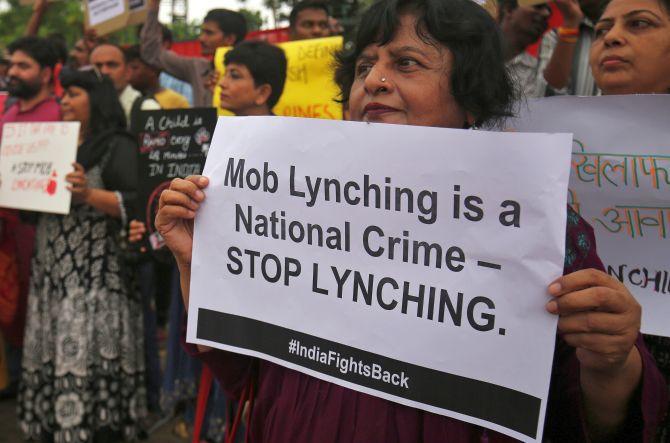Between 2014 and March 3, 2018, 45 people were killed in 40 cases of mob lynching across nine states, and at least 217 persons had been arrested, data compiled by the home ministry show.

The Supreme Court recently ordered that Parliament create a special law against lynching, asserting that “fear of law and veneration for the command of law constitute the foundation of a civilised society.”
The court said: “We think it appropriate to recommend to the legislature, that is, Parliament, to create a separate offence for lynching and provide adequate punishment for the same. We have said so as a special law in this field would instil a sense of fear for law amongst the people who involve themselves in such kinds of activities.”
Last year, the apex court had reminded the Centre and states that they cannot remain silent while vigilantes take the law into their hands in the name of cow protection.
What are the dimensions of this problem?
“The National Crime Records Bureau does not maintain specific data with respect to lynching incidents in the country,” Union Minister of State for Home Affairs Hansraj Ahir told the Rajya Sabha on July 18, when asked whether the government “keeps record of incidents of lynching by mobs which are increasing across several parts of the country”.
However, in its March 2018 response to the Lok Sabha, the home ministry did furnish some data on mob lynchings recorded by states.

Source: Data submitted by the home ministry to Lok Sabha
Please note: States of Meghalaya and Jammu-Kashmir did not provide the data on arrests
Between 2014 and March 3, 2018, 45 people were killed in 40 cases of mob lynching across nine states, and at least 217 persons had been arrested, the data compiled by the home ministry show.
Details on the motive -- whether cow vigilantism, communal or caste hatred, or rumours of child-lifting, etc -- location of the attack and identity of the attacker, and victim, were not available.
Fourteen states and Union Territories -- Bihar, Chhattisgarh, Goa, Karnataka, Madhya Pradesh, Manipur, Odisha, Sikkim, Uttarakhand, West Bengal, the Andaman & Nicobar Islands, Dadra & Nagar Haveli, Delhi, and Puducherry -- had not provided data.










